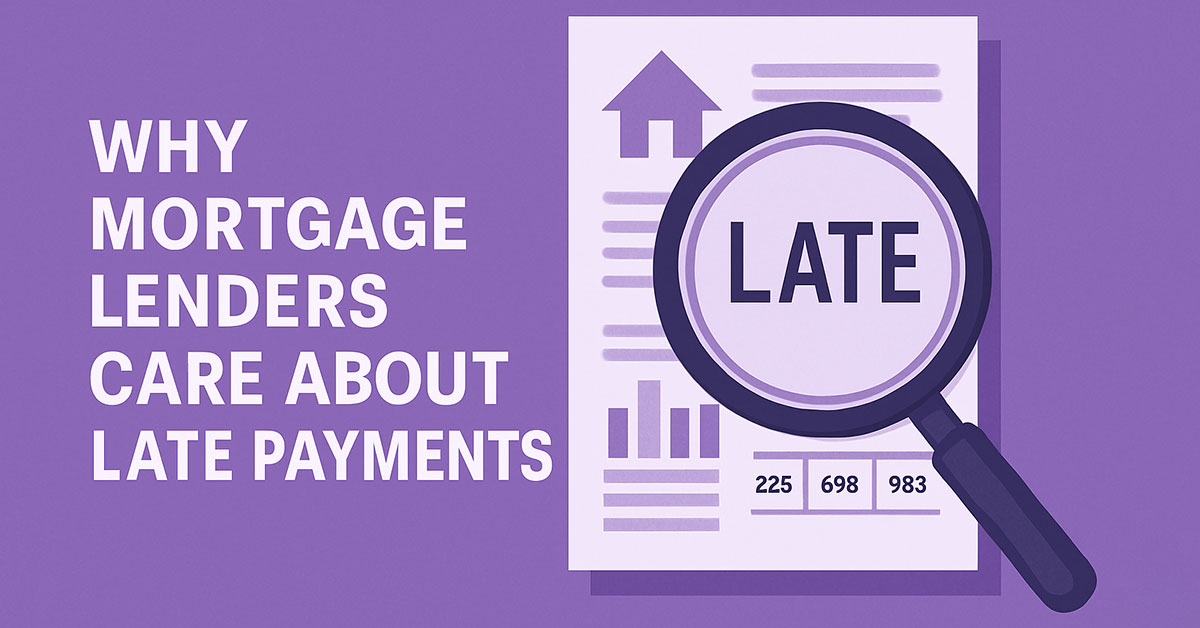Being declined for a mortgage because of late payments is frustrating. We deal with this daily. Based on over 25 years of experience, this guide will show you how to make the odds work in your favour.
You feel you have done everything right to get a mortgage: found a place, sorted your paperwork, maybe even had a mortgage in principle. Then, suddenly, it falls through — all because of a few late payments on your credit file.
It doesn’t feel fair. But the good news? A declined mortgage isn’t the end of the road, especially if you’ve got someone who knows how to deal with these mortgage cases.
Let’s walk through how missed payments affect your mortgage chances, why mortgage lenders react the way they do, and what options you still have.
Do Missed Payments Affect Mortgage Applications?
In short, yes — missed payments affect your mortgage chances.
Mortgage lenders look at your full credit report to decide how risky you are to lend to. And late or missed payments? They stand out. They tell the lender that something’s gone wrong — even if it was just once or twice.
However, not all missed payments are treated equally. A single late phone bill two years ago isn’t the same as recent mortgage arrears.
What If the Late Payment Was a One-Off?
An odd late payment doesn’t have to ruin your chances.
Some lenders understand that things happen — a forgotten direct debit, a bank switch gone wrong, or just life getting in the way. If it’s clear that the issue was temporary and everything’s been fine since, many lenders will be willing to overlook it.
Key factors lenders consider:
- How long ago the late payment occurred
- Whether the account is now up to date
- What type of credit it was on (mortgage vs credit card)
- If there’s a reasonable explanation
This is where adding a short note to your application or having your mortgage broker explain the situation can help.
What Counts as a “Late” Payment?
This bit often surprises people because a payment can be marked late even if it’s just a few days behind.
Most lenders won’t flag a payment that’s one or two days overdue. Some give you a short grace period. But once you’re 30+ days past the due date on a credit agreement, it usually gets reported to the credit reference agencies.
How Late Payments Are Tracked on Your Credit File
Lenders update your credit report monthly. If a payment is late, they’ll note how many months behind you are:
- 1 = One month late
- 2 = Two months late
- And so on…
Even once settled, late payments stay on your report for six years.
Why Mortgage Lenders Care About Late Payments
When you apply for a mortgage, you ask a lender to take a risk. Late payments make that risk feel bigger.
Lenders see your credit history as a window into how you handle money. If you’ve struggled to stay on top of repayments, especially recently, they worry it could happen again.
Most mortgage lenders will look at:
- How many late payments show on your file
- Whether the late payments were on secured loans (like a mortgage or car finance)
- If you’ve missed multiple payments or just one
- Whether the issues were recent or further in the past
- What type of credit was involved — a missed mortgage repayment hits harder than a forgotten phone bill
They’ll also check whether those issues have been resolved or are ongoing.
How Late Payments Show Up on Your Credit Report
Once you’re more than 30 days late, lenders will usually report it to the credit reference agencies. That missed payment becomes part of your credit history — visible to future lenders.
The Lasting Impact of Late Payments
Even if the account is now settled, that missed payment:
- Stays on your credit file for six years
- Lowers your credit score, especially if it was recent
- Raises red flags if tied to mortgage payments or secured loans
If you’ve had several late and missed payments, it might look like you’re struggling to manage finances, even if things are now under control.
Mortgage Declined Due to Late Payment: Common Triggers
A decline doesn’t always mean you can’t get a mortgage, but it does mean the lender saw something they weren’t comfortable with. Late payments are one of the top culprits.
Here are the most common patterns that lead to a mortgage decline:
- Recent missed mortgage payments
- Multiple late and missed payments within a short time
- Secured late payments (like car finance or your current mortgage)
- A history of mortgage arrears
- A low credit score linked to ongoing issues
Even a single missed payment can trigger concern if it was recent or involved a large balance.
Different Lenders, Different Rules
Not all lenders treat late payments the same way. Some will decline straight away, while others take each case on a case-by-case basis—especially specialist lenders who deal with bad credit every day.
Here’s how the main types break down:
- High street lenders (e.g. Halifax, NatWest, Santander) – Usually want a clean credit file for at least 12 months. Even one late payment on your mortgage can lead to a rejection.
- Building societies (like Coventry, Skipton, Newcastle) – Often take a more personal view. Some may consider late payments with a reasonable explanation.
- Specialist lenders (e.g. Precise Mortgages, Pepper Money, Bluestone, Aldermore) – Designed for credit issues. They regularly deal with late or missed payments, but rates may be higher.
- Adverse lenders (e.g. Together, Norton Home Loans) – These work with cases that mainstream lenders won’t touch, including recent mortgage arrears or multiple missed payments.
A mortgage broker who knows these lenders inside out can guide you to the right one, saving you time, stress, and more declines.
How Much Deposit Will You Need with Late Payments?
One of the easiest ways to improve your mortgage chances after late payments is to offer a larger deposit.
Why? Because it reduces the lender’s risk. The more you put in, the less they worry about your credit record.
General Deposit Expectations
Here’s a rough idea of how deposit size affects your options:
| Credit Profile | Typical Deposit Needed |
|---|---|
| Clean credit history | 5%–10% |
| One or two late payments (older) | 10%–15% |
| Recent or multiple late payments | 15%–25% |
| Late payments + defaults or CCJs | 25%+ with specialist lenders |
But remember: these are ballpark figures. Some lenders will go lower if the rest of your profile looks strong; others may ask for more.
Learn more about getting a mortgage with defaults and CCJ mortgages
Can a Bigger Deposit Offset Bad Credit?
In many cases, yes. Even if you’ve had missed payments, a solid deposit (say, 20% or more) shows you’re serious, financially stable, and committed.
It also gives you access to better rates, even if you’re applying through a bad credit mortgage lender.
Can You Still Get a Mortgage with Late Payments?
Yes — you absolutely can. Late payments on your record don’t mean you’re shut out of the mortgage market.
It just means you’ll need to be more selective about which lenders you apply to — and how you present your case.
Key Factors That Matter
Lenders don’t just look at whether you’ve had missed payments — they dig into the detail:
- How recent the late payments were
- How many accounts were affected
- Whether the payments were on secured loans, unsecured debt or personal loans
- If you’ve since rebuilt your credit score
Some high street lenders won’t budge if they see any recent problems. Others — especially specialist mortgage lenders — are much more flexible.
Mortgage With Late Payments – What’s Possible?
You might not qualify for the lowest interest rate on the market. But plenty of lenders will still offer:
- A full-term mortgage
- Competitive fixed or variable rates
- Flexible criteria, looked at on a case-by-case basis
If your finances are now stable and your credit file shows signs of recovery, you’re likely to have more options than you think. You can view your credit fule from all three main credit reference agencies in the UK via CheckMyFile.
What to Do Next If You’ve Been Declined
Getting your mortgage declined, especially over late payments, can feel like the end of the road. But in reality, it’s just a detour.
Here’s how to regroup and give yourself the best chance moving forward.
Your 5-Step Recovery Plan
Sometimes, giving it 3–6 months to rebuild your credit score and show payment consistency makes a big difference.
A short pause now could mean better rates and fewer rejections later.
- Check your credit report
– Get a full copy from Experian, Equifax, or TransUnion.
– Look for any missed payments, defaults, or errors. - Find out why you were declined
– If the lender didn’t tell you, your broker can often find out.
– Pinpointing the issue is key. - Avoid multiple reapplications
– Every failed attempt leaves a mark on your file.
– Stop and reassess before applying again. - Talk to a broker who knows bad credit
– Some lenders work exclusively through brokers, especially for bad credit mortgages.
– This unlocks lenders you wouldn’t get access to directly. - Prepare to strengthen your case
– Save a higher deposit if possible.
– Keep up all payments on your credit going forward.
– Clear any outstanding debt you can.
We can help you get approved for a mortgage, speak to our specialist mortgage advisers here >
How Mortgage Brokers Help You Get Approved
The usual routes can feel like a dead end when you’ve had late payments. That’s where a mortgage broker comes in, especially one who understands how to work with bad credit.
We deal with bad credit ratings every week. And while no two cases are identical, we are experts at the mortgage process of putting the odds in your favour to get a mortgage approval.
What a Broker Actually Does for You
A good broker won’t just “try a few lenders.” They’ll:
- Review your credit report in detail
- Identify which lenders will accept late or missed payments
- Explain what each lender expects (and help you meet it)
- Package your mortgage application so it avoids automatic rejections
- Speak to underwriters directly to make your case, especially where context matters
Most lenders don’t advertise their criteria — going direct often leads to declines.
An experienced broker will already know lenders up to date criteria. That’s why going it alone, especially after a decline, can do more harm than good.
FAQ’s
Can late payments affect getting a mortgage?
Yes, late payments are one of the first things mortgage lenders notice when they review your credit file. Even one or two can impact your chances, especially if they’re recent or tied to a secured loan.
What happens if your mortgage gets declined?
If your mortgage application is declined, don’t panic. You won’t be blacklisted, and it doesn’t mean you can’t try again. But applying again without knowing why you were declined can make things worse. Your best move? Speak to a mortgage broker and get a plan in place.
Is it possible to get a late mortgage payment removed?
Usually, no — unless there was an error. If a late mortgage payment was reported incorrectly, you can dispute it through the credit reference agencies. Otherwise, it will stay on your credit report for six years, though its impact lessens over time.
How do you explain late payments on a mortgage application?
Be honest and brief. Explain what happened (e.g. bank switch, illness, admin error) and confirm the issue is resolved. A good broker can present this clearly to the lender, which often makes a big difference.
Will one missed payment affect my credit score?
Yes — even a single missed payment can lower your credit score, especially if it’s recent. That said, its impact depends on what type of credit it was, how late it was, and whether it was an isolated incident or part of a pattern.
How long after a missed payment can I get a mortgage?
It depends. Some lenders are okay with late payments as soon as 6 months later — especially if you’ve stayed on track since. Others want to see 12 months of clean conduct. Specialist lenders are your best bet if it’s been less than a year.
Do late payments go away after 7 years?
Yes — in the UK, late payments are removed from your credit record after six years (not seven). Once removed, they’ll no longer affect your credit history or mortgage applications.





